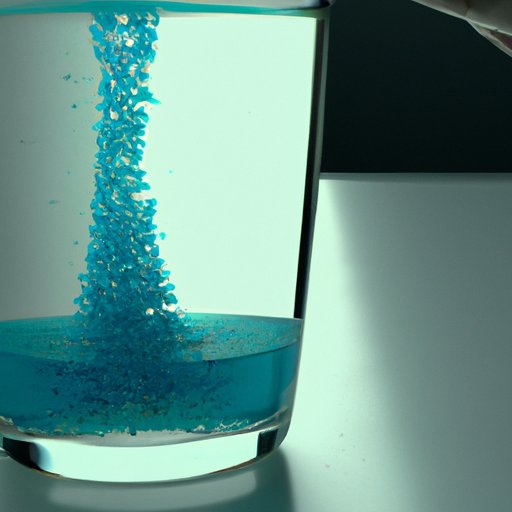
Introduction
Imagine you’re stranded at sea, with no fresh water available. Would you drink salt water to stay hydrated? It’s a tempting thought, but before you do, read on to discover the dangers of drinking salt water and how you can avoid it.

The Dangers of Drinking Saltwater: What You Need to Know
While salt water may look the same as fresh water, it is dangerous to drink. The human body is not equipped to process the salt content in seawater, and drinking it can lead to severe dehydration and other health problems. Saltwater ingestion can also result in a loss of electrolytes, which are essential for our body’s proper functioning. Other risks of drinking saltwater include kidney damage, seizures, and even death in extreme cases.
Surviving at Sea: Is Drinking Saltwater Really an Option?
Being stranded at sea with no fresh water can be a life-threatening situation. In desperation, people may consider drinking salt water as a potential solution. However, consuming saltwater can exacerbate dehydration, which can cause even more harm to the body.
Salt Water and its Effects on the Human Body
When we drink salt water, the salt content in the water will increase the salt concentration in our cells. This causes our body to lose more fluids as it tries to flush out the excess salt. Consequently, we become more dehydrated, which leads to further complications in our body. Our kidneys, which are responsible for filtering out waste from our body, dilute the blood using the water in our body. However, when there’s a high concentration of salt in the bloodstream, the kidneys struggle to filter it out, ultimately leading to damage.
Why Drinking Saltwater Can Lead to Dehydration
Drinking saltwater can cause dehydration for several reasons. First, saltwater will increase the body’s salt concentration, leading to water leaving our cells and flushing more fluids from our system. Moreover, the body will shift into a process called osmosis; water will move from an area of low salt concentration to an area with high salt concentration, eventually leading to cellular dehydration and reduced water content in the organs.
Tips on How to Stay Hydrated in the Ocean Without Drinking Saltwater
If you’re ever stranded at sea, it’s essential to know how to stay hydrated without resorting to drinking saltwater. Here are some tips:
- Collect rainwater with a tarp or make a solar still by collecting moisture from the air and plants.
- Consume non-saltwater fish or seaweed, but make sure to cook it well to remove the salt content.
- Limit physical activity and stay out of direct sunlight, which can accelerate dehydration.
- Use a desalinator or a reverse osmosis device if available.
Myths and Facts About Drinking Saltwater for Hydration
There are many myths surrounding the idea of drinking saltwater for hydration. Some believe that drinking saltwater can work as a temporary solution to dehydration, but the truth is no one can survive solely on saltwater! It’s essential to note that sufficient hydration is crucial to survival.
Alternatives to Drinking Saltwater in Emergency Situations
There are various ways to stay hydrated in emergency situations without resorting to saltwater drinking. For example, consuming a citrus fruit can help promote saliva production and temporarily relieve thirst. Coconut water and sports drinks can also help replace lost electrolytes. If you can’t access an alternative source of hydration, it’s also worth considering rationing your resources and preserving water carefully
Conclusion
Drinking saltwater may seem like a viable solution in desperate situations, but it’s vital to avoid it due to the severe consequences to your body. Instead, prepare for emergencies by acquiring knowledge of water conservation techniques and alternative sources of hydration.





